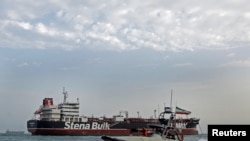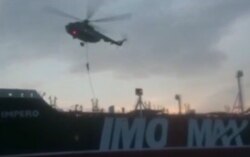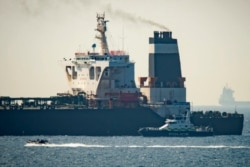Britain's foreign secretary, Jeremy Hunt, told somber lawmakers Monday in a packed House of Commons that Britain was looking to help shape a European-led naval protection mission in the Strait of Hormuz following Friday's seizing of a British-flagged oil tanker in the gulf.
Hunt surprised some lawmakers by refraining from imposing sanctions on Iran for seizing the British-flagged and Swedish-owned Stena Impero. He irritated some Conservative colleagues by turning to European allies to form a maritime protection force in the Strait of Hormuz rather than taking up a U.S. offer for joint patrols in the gulf.
Hunt spoke amid mounting criticism in parliament for falling short in protecting British shipping in the gulf. He told lawmakers that the maritime force it is discussing with European allies, including France, Germany, Italy and Spain, would be separate from U.S. forces in the strait. He is urging British tankers not to sail the strait in the meantime.
But he said that there were would be further discussions about how the European-led force would "complement recent U.S. proposals in this area." Officials say the British are turning to Europe rather than the United States, as London doesn't want to be seen endorsing President Donald Trump's current "maximum pressure" confrontation with Iran.
Hours before Hunt spoke, U.S. Secretary of State Mike Pompeo told Fox News that Britain must protect its own ships from attack in the gulf. British officials say Pompeo's comment came after he had been informed of Britain's plans.
"The responsibility ... falls to the United Kingdom to take care of their ships," Pompeo said when asked about any possible U.S. role in the dispute.
Emergency meeting
Earlier, outgoing British Prime Minister Theresa May chaired a meeting of Britain's emergency Cabinet Office Briefing Rooms (COBRA) committee, which considered the options available to persuade the Iranians to release the vessel and the crew, 18 of whom are Indian, including the captain. Of the other crew members, three are Russian, and two are from Latvia and the Philippines.
A key question for the committee was how to better protect British-flagged vessels passing through the strait, British officials said. Between 15 to 30 British tankers navigate the crucial passageway every day.
Without assistance from its allies, Britain will have difficulty providing the necessary support, declared British defense officials, who say relentless spending cuts are now coming home to roost. Gunboat diplomacy requires gunboats, and Britain now only has 19 frigates and destroyers available to provide home defense and fulfill far-flung global commitments.
That, according to analysts, is a third of the size of the Royal Navy in 1982 during the Falklands War.
In an interview Monday with The Times, Tobias Ellwood, one of Britain's defense ministers, acknowledged the Royal Navy is now too small to fulfill a full global role.
"The threats we're facing are changing in front of us, the world is getting more complex," he told the newspaper. "If we are wanting to continue to play this influential role on the international stage, it will require further funding for our armed forces, not least the Royal Navy. Our Royal Navy is too small to manage our interests across the globe," he added.
Growing criticism
Nonetheless, resource-limited or not, former British military chiefs say more could have been done to prevent an Iranian seizure. They are fuming at the lack of contingency planning before the Stena Impero was boarded Friday and taken into Iranian territorial waters.
They argue it was always likely that Iran would grab a British-flagged vessel after British marines impounded an Iranian-owned tanker off the waters of Gibraltar earlier this month for breaching European Union sanctions on shipping oil to Syria.
Just days before the Stena Impero was seized, two extra warships were dispatched to the gulf to back up a frigate, the HMS Montrose, that was already stationed there. That frigate tried to stop the Iranians but was an hour's sailing time away and arrived too late to do anything.
Richard Dannatt, a former top British general and a member of the House of Lords, joined the burgeoning criticism.
"It would have been prudent to prevent our shipping from being seized," he told reporters. "We failed. It was known that the Iranians would try to seize a British ship, and it would have been wise to ensure none were in danger. It's perfectly possible to come up with an escort for ships through the strait."
"We need to invest in frigates and destroyers," he added.
Several lawmakers added their voices to the mounting frustration, arguing Monday in the House of Commons that the government had taken its eye off the ball, distracted by a weeks-long Conservative leadership race to replace May and by the ongoing divisive saga of Brexit.
U.S. involvement
Some analysts and lawmakers worry that the time and political maneuvering room to avoid a serious confrontation between Britain and Iran is vanishing fast.
They argue that London will have no option eventually but to turn to Washington for help, despite major British reservations, shared by European allies, over Trump's reimposition of economic sanctions on Iran following his decision to abandon an international treaty lifting them in return for Tehran curbing its nuclear program.
Turning to Washington would further complicate Britain's Brexit endgame and its search for a new exit deal from the European Union that won't hurt its commerce and economy.
May was criticized Monday by former Conservative Party leader Iain Duncan Smith for having turned down an offer days ago from the U.S. to help protect British ships. But "May didn't want to upset the Iranians," he said.
"The government didn't take up the offer," he added. "They made a major miscalculation. It was a big misjudgment, and it goes all the way to the top," he added.
Iran video
As Britain announced the initial measures it will take after the Stena Impero was seized, the Iranians released video of the oil tanker's crew for the first time since Iran's Revolutionary Guards took control of the vessel.
In the video, some members of the crew are seen working in the kitchen, while others are on one of the decks looking toward an officer standing by a pile of shoes. There are also scenes of the vessel's officers being instructed and questioned, presumably on operations, by the guardsmen.
On Friday, Iran broadcast video footage of the moment members of the guard rappelled onto the vessel, which is now being held at the Bandar Abbas port.
Relatives of Dijo Pappachan, a crew member from Kochi, India, told a gulf newspaper they were in shock over the incident.
"He called and spoke with his mother on Thursday morning saying he is on his way to Saudi Arabia from Dubai," the sailor's father said. "To our utter shock, we got a call from his company the next day saying the ship is under Iran's custody. I am not speaking only for my son. All the 23 crew members set sail to foreign countries for work. They are onboard to make a living. We are all praying for the entire crew's safe return."








